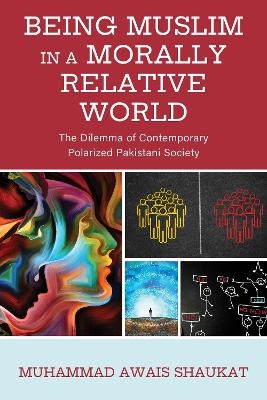
Being Muslim in a Morally Relative World
The Dilemma of Contemporary Polarized Pakistani Society
Seiten
2024
Lexington Books/Fortress Academic (Verlag)
978-1-6669-6626-8 (ISBN)
Lexington Books/Fortress Academic (Verlag)
978-1-6669-6626-8 (ISBN)
- Titel nicht im Sortiment
- Artikel merken
This book explores the challenges Islamic societies face due to globalization and the internationalization of Western values. Using Pakistani society as an example, it examines the differences between the Islamic value system and moral relativism, and the resulting ideological conflicts that lead to extreme polarization in societies.
Being Muslim in a Morally Relative World: The Dilemma of Contemporary Polarized Pakistani Society examines the challenges faced by Islamic societies in the 21st century, particularly in Pakistan, as they navigate the influences of globalization and Western intellectual movements. Muhammad Awais Shaukat offers a detailed analysis comparing the Islamic value system with the concept of moral relativism, exploring how these contrasting ethical frameworks shape individual and societal behaviors, values, and beliefs. The book investigates the conflict between traditional Islamic morality, rooted in the Qur’an and Sunnah, which upholds absolute and objective values, and the relativistic, subjective morality emerging from post-modernism. By leveraging his multidisciplinary expertise, the author illustrates how these conflicting values have intensified polarization within Muslim societies, amplified by media and intellectual discourse. The book contributes not only to academic discourse but also offers practical insights for policymakers, educators, and community leaders, offering a framework for developing pathways toward social harmony and cohesion.
Being Muslim in a Morally Relative World: The Dilemma of Contemporary Polarized Pakistani Society examines the challenges faced by Islamic societies in the 21st century, particularly in Pakistan, as they navigate the influences of globalization and Western intellectual movements. Muhammad Awais Shaukat offers a detailed analysis comparing the Islamic value system with the concept of moral relativism, exploring how these contrasting ethical frameworks shape individual and societal behaviors, values, and beliefs. The book investigates the conflict between traditional Islamic morality, rooted in the Qur’an and Sunnah, which upholds absolute and objective values, and the relativistic, subjective morality emerging from post-modernism. By leveraging his multidisciplinary expertise, the author illustrates how these conflicting values have intensified polarization within Muslim societies, amplified by media and intellectual discourse. The book contributes not only to academic discourse but also offers practical insights for policymakers, educators, and community leaders, offering a framework for developing pathways toward social harmony and cohesion.
Muhammad Awais Shaukat is director of academics and programs at Ehya Education Services, Lahore.
Introduction
Chapter 1: Morality and System of Values
Chapter 2: Islamic Value System
Chapter 3: Man: A Spiritual and Moral Self
Chapter 4: The Evolution of Modern Thought and its Impact on Moral Philosophy: From the Renaissance to Post-Modern Times
Chapter 5: Exploring Moral Relativism: Genealogy, Scope, and Implications
Chapter 6: Moral Relativism and Contemporary Islamic Discourses
Chapter 7: Moral Polarization in Pakistan
Conclusion
| Erscheinungsdatum | 15.11.2024 |
|---|---|
| Reihe/Serie | Lexington Studies in Islamic Thought |
| Sprache | englisch |
| Maße | 152 x 229 mm |
| Themenwelt | Geisteswissenschaften ► Religion / Theologie ► Islam |
| Sozialwissenschaften ► Soziologie ► Spezielle Soziologien | |
| ISBN-10 | 1-6669-6626-6 / 1666966266 |
| ISBN-13 | 978-1-6669-6626-8 / 9781666966268 |
| Zustand | Neuware |
| Haben Sie eine Frage zum Produkt? |
Mehr entdecken
aus dem Bereich
aus dem Bereich


